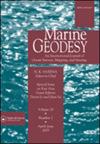Satellite Derived Bathymetry with Sentinel-2 Imagery: Comparing Traditional Techniques with Advanced Methods and Machine Learning Ensemble Models
IF 1.4
4区 地球科学
Q2 GEOCHEMISTRY & GEOPHYSICS
引用次数: 7
Abstract
Abstract Accurate charting of nearshore bathymetry is critical to the safe and dependable use of coastal waterways frequented by the trading, fishing, tourism, and ocean energy industries. The accessibility of satellite imagery and the availability of various satellite-derived bathymetry (SDB) techniques have provided a cost-effective alternative to traditional in-situ bathymetric surveys. Furthermore, improved algorithms and the advancement of machine learning models have provided opportunity for higher quality bathymetric derivations. However, to date the relative accuracy and performance between traditional physics-based techniques, improved physics-based methods, and machine learning ensemble models have not been adequately quantified. In this study, nearshore bathymetry is derived from Sentinel-2 satellite imagery near La Parguera, Puerto Rico utilizing a traditional band-ratio algorithm, a band-ratio switching method, a random forest machine learning model, and the XGBoost machine learning model. The machine learning models returned comparable results and were markedly more accurate relative to other techniques; however, both machine learning models required an extensive training dataset. All models were constrained by environmental influences and image spatial resolution, which were assessed to be the limiting factors for routine use of satellite-derived bathymetry as a reliable method for hydrographic surveying.Sentinel-2成像的卫星测深:传统技术与先进方法的比较和机器学习集成模型
近岸水深测量的准确绘制对于贸易、渔业、旅游和海洋能源行业频繁使用的沿海航道的安全可靠使用至关重要。卫星图像的可访问性和各种卫星衍生测深(SDB)技术的可用性为传统的原位测深提供了一种具有成本效益的替代方案。此外,改进的算法和机器学习模型的进步为更高质量的水深衍生提供了机会。然而,迄今为止,传统的基于物理的技术、改进的基于物理的方法和机器学习集成模型之间的相对准确性和性能还没有得到充分的量化。在本研究中,利用传统的带比算法、带比切换方法、随机森林机器学习模型和XGBoost机器学习模型,从波多黎各La Parguera附近的Sentinel-2卫星图像中获得近岸水深测量数据。机器学习模型返回了类似的结果,并且相对于其他技术明显更准确;然而,这两种机器学习模型都需要广泛的训练数据集。所有模型都受到环境影响和图像空间分辨率的限制,这被评估为常规使用卫星衍生测深作为可靠的水文测量方法的限制因素。
本文章由计算机程序翻译,如有差异,请以英文原文为准。
求助全文
约1分钟内获得全文
求助全文
来源期刊

Marine Geodesy
地学-地球化学与地球物理
CiteScore
4.10
自引率
6.20%
发文量
27
审稿时长
>12 weeks
期刊介绍:
The aim of Marine Geodesy is to stimulate progress in ocean surveys, mapping, and remote sensing by promoting problem-oriented research in the marine and coastal environment.
The journal will consider articles on the following topics:
topography and mapping;
satellite altimetry;
bathymetry;
positioning;
precise navigation;
boundary demarcation and determination;
tsunamis;
plate/tectonics;
geoid determination;
hydrographic and oceanographic observations;
acoustics and space instrumentation;
ground truth;
system calibration and validation;
geographic information systems.
 求助内容:
求助内容: 应助结果提醒方式:
应助结果提醒方式:


